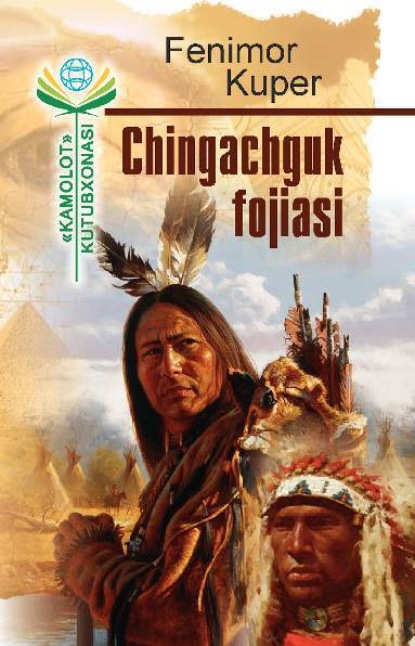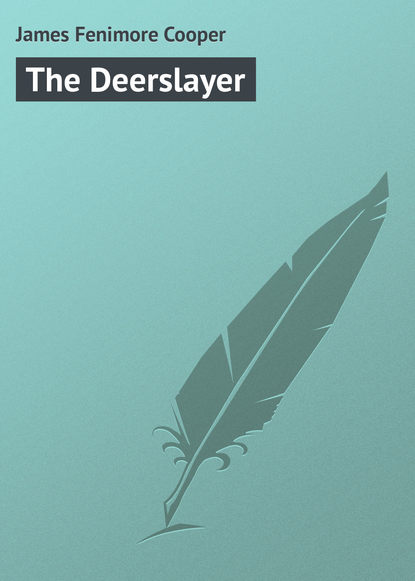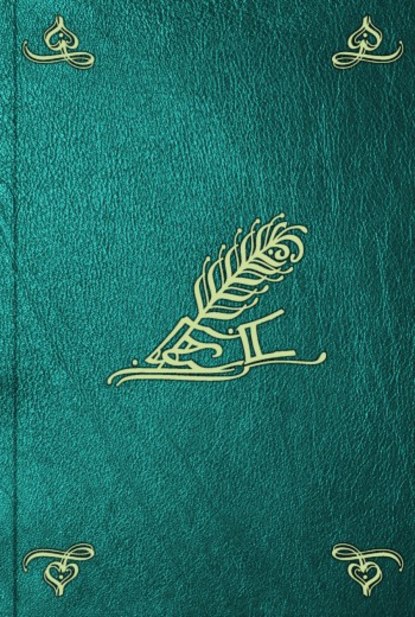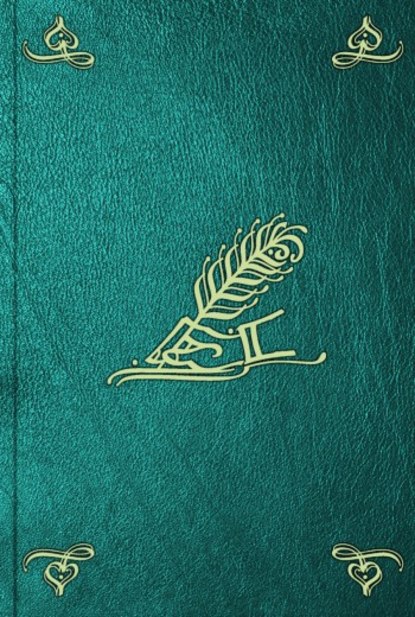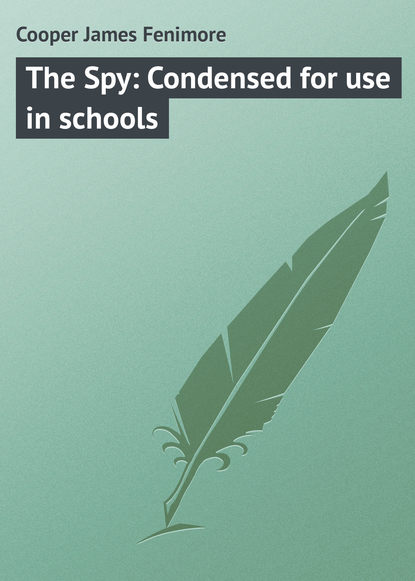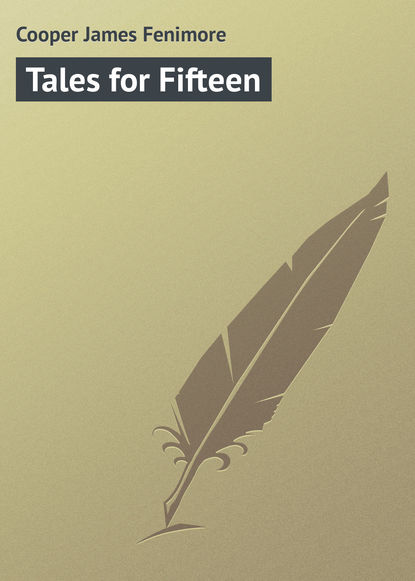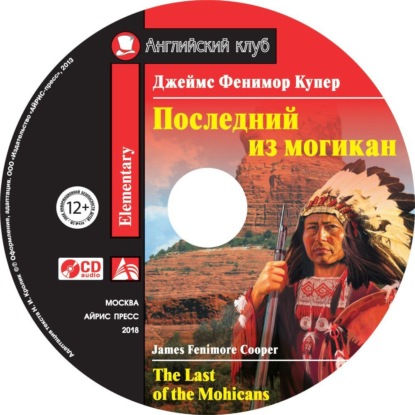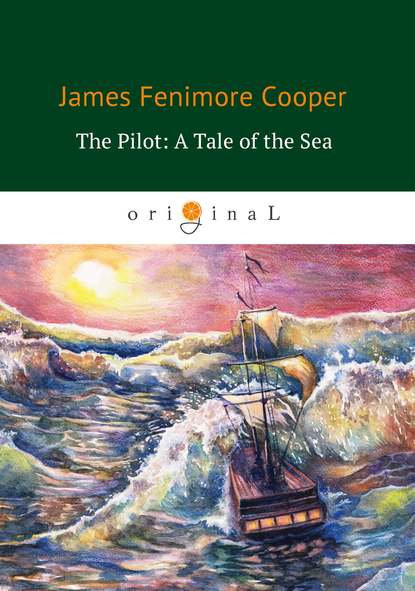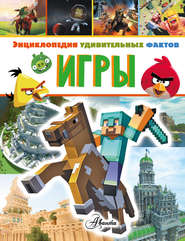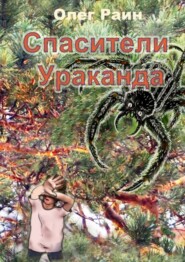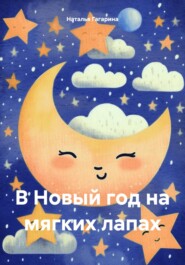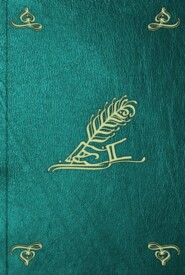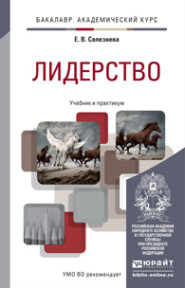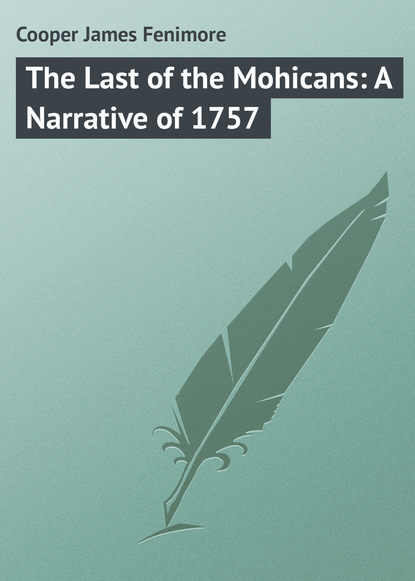 ТекстПолная версия
ТекстПолная версия The Last of the Mohicans: A Narrative of 1757
Полная версия
- О книге
- Читать
"The waters in the woods, and on the great lakes, run downward until they lie like my hand," said the Indian, stretching the limb horizontally before him, "and then they run no more."
"No honest man will deny it," said the scout, a little nettled at the implied distrust of his explanation of the mystery of the tides; "and I grant that it is true on the small scale, and where the land is level. But everything depends on what scale you look at things. Now, on the small scale, the 'arth is level; but on the large scale it is round. In this manner, pools and ponds, and even the great fresh-water lake, may be stagnant, as you and I both know they are, having seen them; but when you come to spread water over a great tract, like the sea, where the earth is round, how in reason can the water be quiet? You might as well expect the river to lie still on the brink of those black rocks a mile above us, though your own ears tell you that it is tumbling over them at this very moment!"
If unsatisfied by the philosophy of his companion, the Indian was far too dignified to betray his unbelief. He listened like one who was convinced, and resumed his narrative in his former solemn manner.
"We came from the place where the sun is hid at night, over great plains where the buffaloes live, until we reached the big river. There we fought the Alligewi, till the ground was red with their blood. From the banks of the big river to the shores of the salt lake, there was none to meet us. The Maquas followed at a distance. We said the country should be ours from the place where the water runs up no longer on this stream, to a river twenty suns' journey toward the summer. The land we had taken like warriors, we kept like men. We drove the Maquas into the woods with the bears. They only tasted salt at the licks; they drew no fish from the great lake; we threw them the bones."
"All this I have heard and believe," said the white man, observing that the Indian paused: "but it was long before the English came into the country."
"A pine grew then where this chestnut now stands. The first pale-faces who came among us spoke no English. They came in a large canoe, when my fathers had buried the tomahawk with the redmen around them. Then, Hawkeye," he continued, betraying his deep emotion only by permitting his voice to fall to those low, guttural tones, which rendered his language, as spoken at times, so very musical; "then, Hawkeye, we were one people, and we were happy. The salt lake gave us its fish, the wood its deer, and the air its birds. We took wives who bore us children; we worshipped the Great Spirit; and we kept the Maquas beyond the sound of our songs of triumph!"
"Know you anything of your own family at that time?" demanded the white. "But you are a just man, for an Indian! and, as I suppose you hold their gifts, your fathers must have been brave warriors, and wise men at the council fire."
"My tribe is the grandfather of nations, but I am an unmixed man. The blood of chiefs is in my veins, where it must stay forever. The Dutch landed, and gave my people the fire-water; they drank until the heavens and the earth seemed to meet, and they foolishly thought they had found the Great Spirit. Then they parted with their land. Foot by foot, they were driven back from the shores, until I, that am a chief and a sagamore, have never seen the sun shine but through the trees, and have never visited the graves of, my fathers!"
"Graves bring solemn feelings over the mind," returned the scout, a good deal touched at the calm suffering of his companion; "and they often aid a man in his good intentions; though, for myself, I expect to leave my own bones unburied, to bleach in the woods, or to be torn asunder by the wolves. But where are to be found those of your race who came to their kin in the Delaware country, so many summers since?"
"Where are the blossoms of those summers! – fallen, one by one: so all of my family departed, each in his turn, to the land of spirits. I am on the hill-top, and must go down into the valley; and when Uncas follows in my footsteps, there will no longer be any of the blood of the sagamores, for my boy is the last of the Mohicans."
"Uncas is here!" said another voice, in the same soft, guttural tones, near his elbow; "who speaks to Uncas?"
The white man loosened his knife in his leathern sheath, and made an involuntary movement of the hand towards his rifle, at this sudden interruption; but the Indian sat composed, and without turning his head at the unexpected sounds.
At the next instant, a youthful warrior passed between them, with a noiseless step, and seated himself on the bank of the rapid stream. No exclamation of surprise escaped the father, nor was any question asked, or reply given, for several minutes; each appearing to await the moment when he might speak, without betraying womanish curiosity or childish impatience. The white man seemed to take counsel from their customs, and, relinquishing his grasp of the rifle, he also remained silent and reserved. At length Chingachgook turned his eyes slowly towards his son, and demanded, —
"Do the Maquas dare to leave the print of their moccasins in these woods?"
"I have been on their trail," replied the young Indian, "and know that they number as many as the fingers of my two hands; but they lie hid, like cowards."
"The thieves are outlying for scalps and plunder!" said the white man, whom we shall call Hawkeye, after the manner of his companions. "That bushy Frenchman, Montcalm, will send his spies into our very camp, but he will know what road we travel!"
"Tis enough!" returned the father, glancing his eye towards the setting sun; "they shall be driven like deer from their bushes. Hawkeye, let us eat to-night, and show the Maquas that we are men to-morrow."
"I am as ready to do the one as the other; but to fight the Iroquois 'tis necessary to find the skulkers; and to eat, 'tis necessary to get the game – talk of the devil and he will come; there is a pair of the biggest antlers I have seen this season, moving the bushes below the hill! Now, Uncas," he continued in a half whisper, and laughing with a kind of inward sound, like one who had learnt to be watchful, "I will bet my charger three times full of powder, against a foot of wampum, that I take him atwixt the eyes, and nearer to the right than to the left."
"It cannot be!" said the young Indian, springing to his feet with youthful eagerness; "all but the tips of his horns are hid!"
"He's a boy!" said the white man, shaking his head while he spoke, and addressing the father. "Does he think when a hunter sees a part of the creatur', he can't tell where the rest of him should be!"
Adjusting his rifle, he was about to make an exhibition of that skill, on which he so much valued himself, when the warrior struck up the piece with his hand, saying —
"Hawkeye! will you fight the Maquas?"
"These Indians know the nature of the woods, as it might be by instinct!" returned the scout, dropping his rifle, and turning away like a man who was convinced of his error. "I must leave the buck to your arrow, Uncas, or we may kill a deer for them thieves, the Iroquois, to eat."
The instant the father seconded this intimation by an expressive gesture of the hand, Uncas threw himself on the ground, and approached the animal with wary movements. When within a few yards of the cover, he fitted an arrow to his bow with the utmost care, while the antlers moved, as if their owner snuffed an enemy in the tainted air. In another moment the twang of the cord was heard, a white streak was seen glancing into the bushes, and the wounded buck plunged from the cover, to the very feet of his hidden enemy. Avoiding the horns of the infuriated animal, Uncas darted to his side, and passed his knife across the throat, when bounding to the edge of the river it fell, dyeing the waters with its blood.
"'Twas done with Indian skill," said the scout, laughing inwardly, but with vast satisfaction; "and 'twas a pretty sight to behold! Though an arrow is a near shot, and needs a knife to finish the work."
"Hugh!" ejaculated his companion, turning quickly, like a hound who scented game.
"By the Lord, there is a drove of them!" exclaimed the scout, whose eyes began to glisten with the ardor of his usual occupation; "if they come within range of a bullet I will drop one, though the whole Six Nations should be lurking within sound! What do you hear, Chingachgook? for to my ears the woods are dumb."
"There is but one deer, and he is dead," said the Indian, bending his body till his ear nearly touched the earth. "I hear the sounds of feet!"
"Perhaps the wolves have driven the buck to shelter, and are following on his trail."
"No. The horses of white men are coming!" returned the other, raising himself with dignity, and resuming his seat on the log with his former composure. "Hawkeye, they are your brothers; speak to them."
"That will I, and in English that the king needn't be ashamed to answer," returned the hunter, speaking in the language of which he boasted; "but I see nothing, nor do I hear the sounds of man or beast; 'tis strange that an Indian should understand white sounds better than a man who, his very enemies will own, has no cross in his blood, although he may have lived with the redskins long enough to be suspected! Ha! there goes something like the cracking of a dry stick, too – now I hear the bushes move – yes, yes, there is a trampling that I mistook for the falls – and – but here they come themselves; God keep them from the Iroquois!"
CHAPTER IV
"Well, go thy way: thou shalt not from this groveTill I torment thee for this injury."Midsummer Night's Dream.The words were still in the mouth of the scout, when the leader of the party, whose approaching footsteps had caught the vigilant ear of the Indian, came openly into view. A beaten path, such as those made by the periodical passage of the deer, wound through a little glen at no great distance, and struck the river at the point where the white man and his red companions had posted themselves. Along this track the travellers, who had produced a surprise so unusual in the depths of the forest, advanced slowly towards the hunter, who was in front of his associates, in readiness to receive them.
"Who comes?" demanded the scout, throwing his rifle carelessly across his left arm, and keeping the forefinger of his right hand on the trigger, though he avoided all appearance of menace in the act, "Who comes hither, among the beasts and dangers of the wilderness?"
"Believers in religion, and friends to the law and to the king," returned he who rode foremost. "Men who have journeyed since the rising sun, in the shades of this forest, without nourishment, and are sadly tired of their wayfaring."
"You are, then, lost," interrupted the hunter, "and have found how helpless 'tis not to know whether to take the right hand or the left?"
"Even so; sucking babes are not more dependent on those who guide them than we who are of larger growth, and who may now be said to possess the stature without the knowledge of men. Know you the distance to a post of the crown called William Henry?"
"Hoot!" shouted the scout, who did not spare his open laughter, though, instantly checking the dangerous sounds, he indulged his merriment at less risk of being overheard by any lurking enemies. "You are as much off the scent as a hound would be, with Horican atwixt him and the deer! William Henry, man! if you are friends to the king, and have business with the army, your better way would be to follow the river down to Edward, and lay the matter before Webb; who tarries there, instead of pushing into the defiles, and driving this saucy Frenchman back across Champlain, into his den again."
Before the stranger could make any reply to this unexpected proposition, another horseman dashed the bushes aside, and leaped his charger into the pathway, in front of his companion.
"What, then, may be our distance from Fort Edward?" demanded a new speaker; "the place you advise us to seek we left this morning, and our destination is the head of the lake."
"Then you must have lost your eyesight afore losing your way, for the road across the portage is cut to a good two rods, and is as grand a path, I calculate, as any that runs into London, or even before the palace of the king himself."
"We will not dispute concerning the excellence of the passage," returned Heyward, smiling; for, as the reader has anticipated, it was he. "It is enough, for the present, that we trusted to an Indian guide to take us by a nearer, though blinder path, and that we are deceived in his knowledge. In plain words, we know not where we are."
"An Indian lost in the woods!" said the scout, shaking his head doubtingly; "when the sun is scorching the tree-tops, and the water-courses are full; when the moss on every beech he sees, will tell him in which quarter the north star will shine at night! The woods are full of deer paths which run to the streams and licks, places well known to everybody; nor have the geese done their flight to the Canada waters altogether! 'Tis strange that an Indian should be lost atwixt Horican and the bend in the river. Is he a Mohawk?"
"Not by birth, though adopted in that tribe; I think his birthplace was farther north, and he is one of those you call a Huron."
"Hugh!" exclaimed the two companions of the scout, who had continued, until this part of the dialogue, seated immovable, and apparently indifferent to what passed, but who now sprang to their feet with an activity and interest that had evidently got the better of their reserve, by surprise.
"A Huron!" repeated the sturdy scout, once more shaking his head in open distrust; "they are a thievish race, nor do I care by whom they are adopted; you can never make anything of them but skulks and vagabonds. Since you trusted yourself to the care of one of that nation, I only wonder that you have not fallen in with more."
"Of that there is little danger, since William Henry is so many miles in our front. You forget that I have told you our guide is now a Mohawk, and that he serves with our forces as a friend."
"And I tell you that he who is born a Mingo will die a Mingo," returned the other, positively. "A Mohawk! No, give me a Delaware or a Mohican for honesty; and when they will fight, which they won't all do, having suffered their cunning enemies, the Maquas, to make them women – but when they will fight at all, look to a Delaware, or a Mohican, for a warrior!"
"Enough of this," said Heyward, impatiently; "I wish not to inquire into the character of a man that I know, and to whom you must be a stranger. You have not yet answered my question: what is our distance from the main army at Edward?"
"It seems that may depend on who is your guide. One would think such a horse as that might get over a good deal of ground atwixt sun-up and sun-down."
"I wish no contention of idle words with you, friend," said Heyward, curbing his dissatisfied manner, and speaking in a more gentle voice; "if you will tell me the distance to Fort Edward, and conduct me thither, your labor shall not go without its reward."
"And in so doing, how know I that I don't guide an enemy, and a spy of Montcalm, to the works of the army? It is not every man who can speak the English tongue that is an honest subject."
"If you serve with the troops, of whom I judge you to be a scout, you should know of such a regiment of the king as the 60th."
"The 60th! you can tell me little of the Royal Americans that I don't know, though I do wear a hunting-shirt instead of a scarlet jacket."
"Well, then, among the other things, you may know the name of its major?"
"Its major!" interrupted the hunter, elevating his body like one who was proud of his trust. "If there is a man in the country who knows Major Effingham, he stands before you."
"It is a corps which has many majors; the gentleman you name is the senior, but I speak of the junior of them all; he who commands the companies in garrison at William Henry."
"Yes, yes, I have heard that a young gentleman of vast riches, from one of the provinces far south, has got the place. He is over young, too, to hold such rank, and to be put above men whose heads are beginning to bleach; and yet they say he is a soldier in his knowledge, and a gallant gentleman!"
"Whatever he may be, or however he may be qualified for his rank, he now speaks to you, and of course can be no enemy to dread."
The scout regarded Heyward in surprise, and then lifting his cap, he answered, in a tone less confident than before, though still expressing doubt, —
"I have heard a party was to leave the encampment this morning, for the lake shore."
"You have heard the truth; but I preferred a nearer route, trusting to the knowledge of the Indian I mentioned."
"And he deceived you, and then deserted?"
"Neither, as I believe; certainly not the latter, for he is to be found in the rear."
"I should like to look at the creatur'; if it is a true Iroquois I can tell him by his knavish look, and by his paint," said the scout, stepping past the charger of Heyward, and entering the path behind the mare of the singing-master, whose foal had taken advantage of the halt to exact the maternal contribution. After shoving aside the bushes, and proceeding a few paces, he encountered the females, who awaited the result of the conference with anxiety, and not entirely without apprehension. Behind these, the runner leaned against a tree, where he stood the close examination of the scout with an air unmoved, though with a look so dark and savage, that it might in itself excite fear. Satisfied with his scrutiny, the hunter soon left him. As he repassed the females, he paused a moment to gaze upon their beauty, answering to the smile and nod of Alice with a look of open pleasure. Thence he went to the side of the motherly animal, and spending a minute in a fruitless inquiry into the character of her rider, he shook his head and returned to Heyward.
"A Mingo is a Mingo, and God having made him so, neither the Mohawks nor any other tribe can alter him," he said, when he had regained his former position. "If we were alone, and you would leave that noble horse at the mercy of the wolves to-night, I could show you the way to Edward, myself, within an hour, for it lies only about an hour's journey hence; but with such ladies in your company 'tis impossible!"
"And why? they are fatigued, but they are quite equal to a ride of a few more miles."
"'Tis a natural impossibility!" repeated the scout; "I wouldn't walk a mile in these woods after night gets into them, in company with that runner, for the best rifle in the colonies. They are full of outlying Iroquois, and your mongrel Mohawk knows where to find them too well, to be my companion."
"Think you so?" said Heyward, leaning forward in the saddle, and dropping his voice nearly to a whisper; "I confess I have not been without my own suspicions, though I have endeavored to conceal them, and affected a confidence I have not always felt, on account of my companions. It was because I suspected him that I would follow no longer; making him, as you see, follow me."
"I knew he was one of the cheats as soon as I laid eyes on him!" returned the scout, placing a finger on his nose, in sign of caution. "The thief is leaning against the foot of the sugar sapling, that you can see over them bushes; his right leg is in a line with the bark of the tree, and," tapping his rifle, "I can take him from where I stand, between the ankle and the knee, with a single shot, putting an end to his tramping through the woods, for at least a month to come. If I should go back to him, the cunning varmint would suspect something, and be dodging through the trees like a frightened deer."
"It will not do. He may be innocent, and I dislike the act. Though, if I felt confident of his treachery – "
"'Tis a safe thing to calculate on the knavery of an Iroquois," said the scout, throwing his rifle forward, by a sort of instinctive movement.
"Hold!" interrupted Heyward, "it will not do – we must think of some other scheme; and yet, I have much reason to believe the rascal has deceived me."
The hunter, who had already abandoned his intention of maiming the runner, mused a moment, and then made a gesture, which instantly brought his two red companions to his side. They spoke together earnestly in the Delaware language, though in an undertone; and by the gestures of the white man, which were frequently directed towards the top of the sapling, it was evident he pointed out the situation of their hidden enemy. His companions were not long in comprehending his wishes, and laying aside their fire-arms, they parted, taking opposite sides of the path, and burying themselves in the thicket, with such cautious movements, that their steps were inaudible.
"Now, go you back," said the hunter, speaking again to Heyward, "and hold the imp in talk; these Mohicans here will take him without breaking his paint."
"Nay," said Heyward, proudly, "I will seize him myself."
"Hist! what could you do, mounted, against an Indian in the bushes?"
"I will dismount."
"And, think you, when he saw one of your feet out of the stirrup, he would wait for the other to be free? Whoever comes into the woods to deal with the natives, must use Indian fashions, if he would wish to prosper in his undertakings. Go, then, talk openly to the miscreant, and seem to believe him the truest friend you have on 'arth."
Heyward prepared to comply, though with strong disgust at the nature of the office he was compelled to execute. Each moment, however, pressed upon him a conviction of the critical situation in which he had suffered his invaluable trust to be involved through his own confidence. The sun had already disappeared, and the woods, suddenly deprived of his light,9 were assuming a dusky hue, which keenly reminded him that the hour the savage usually chose for his most barbarous and remorseless acts of vengeance or hostility, was speedily drawing near. Stimulated by apprehension, he left the scout, who immediately entered into a loud conversation with the stranger that had so unceremoniously enlisted himself in the party of travellers that morning. In passing his gentler companions Heyward uttered a few words of encouragement, and was pleased to find that, though fatigued with the exercise of the day, they appeared to entertain no suspicion that their present embarrassment was other than the result of accident. Giving them reason to believe he was merely employed in a consultation concerning the future route, he spurred his charger, and drew the reins again, when the animal had carried him within a few yards of the place where the sullen runner still stood, leaning against the tree.
"You may see, Magua," he said, endeavoring to assume an air of freedom and confidence, "that the night is closing around us, and yet we are no nearer to William Henry than when we left the encampment of Webb with the rising sun. You have missed the way, nor have I been more fortunate. But, happily we have fallen in with a hunter, he whom you hear talking to the singer, that is acquainted with the deer-paths and by-ways of the woods, and who promises to lead us to a place where we may rest securely till the morning."
The Indian riveted his glowing eyes on Heyward as he asked, in his imperfect English, "Is he alone?"
"Alone!" hesitatingly answered Heyward to whom deception was too new to be assumed without embarrassment. "O! not alone, surely, Magua, for you know that we are with him."
"Then Le Renard Subtil will go," returned the runner, coolly raising his little wallet from the place where it had lain at his feet; "and the pale-faces will see none but their own color."
"Go! Whom call you Le Renard?"
"'Tis the name his Canada fathers have given to Magua," returned the runner, with an air that manifested his pride at the distinction. "Night is the same as day to Le Subtil, when Munro waits for him."
"And what account will Le Renard give the chief of William Henry concerning his daughters? Will he dare to tell the hot-blooded Scotsman that his children are left without a guide, though Magua promised to be one?"
"Though the gray head has a loud voice, and a long arm, Le Renard will not hear him, or feel him, in the woods."
"But what will the Mohawks say? They will make him petticoats, and bid him stay in the wigwam with the women, for he is no longer to be trusted with the business of a man."



